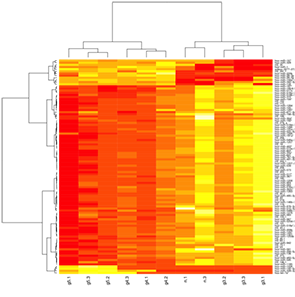Renal cancer

The Cambridge Renal Cancer Group (CamRenCan) is a collaboration of basic and translational scientists together with clinicians working synergistically towards the common goal of improving outcomes of patients with renal cancer via multimodal research strategies.
The Centre runs internationally recognised programmes in the genetics of the disease and the metabolic consequences of those genetic abnormalities, in understanding tumour biology and in the treatment of resulting malignancies.
1. Molecular mechanisms of renal cancer progression. Several large-scale resequencing efforts have characterized the genomic landscapes of renal cancer. Unlike in many other cancer types, however, few actionable genetic alterations have been identified. Experimental approaches are thus needed for a better understanding of the molecular mechanisms of renal cancer progression. CamRenCan harbours several world-class research groups that focus on functional analysis of renal cancer in a wide range of model systems and experimental areas, such as metabolomics, functional genetics, drug development and stem cell biology. This work is intimately linked with the analysis of clinical renal cancer cohorts, for which genetically and pathologically well-characterised patient-donated cancer tissue with high fidelity clinical information is essential. We are also continuously developing new renal cancer models for functional biology. The aim of this work is to identify novel molecular dependencies in renal cancer for further translational development.
2. Identification of kidney cancer at a curable stage. We seek to improve identification of patients with curable, early stage renal cancer before this progresses to lethal disease. A key aspect of this approach is the improved delineation of which small renal masses are malignant rather than benign (~30% cases), this is currently challenging on standard imaging approaches and hence many patients are exposed to potentially unnecessary surgery. Furthermore, we need to better understand which small renal cancers have the potential for rapid progression. In this work, patients with hereditary renal cancer and hence established tumourigenic genetic mutations will be studied (via CCC medical and surgical renal genetics clinics) together with those patients with sporadic disease. Using experimental radiology, circulating tumour DNA, metabolomics and cell of origin studies these lesions will be better delineated than is currently possible, leading to a rapid improvement in patient care.
3. Optimal management of patients with high risk initially localised renal cancers. In this theme of work, we aim to improve identification of the patients with high-risk renal cancer who will relapse after nephrectomy for whom there are currently limited curative treatment options available. We seek to identify the therapies to which such patients would benefit from. Successful adjuvant treatment of RCC would make a substantial impact on the burden of the disease. No adjuvant therapy has been proven to date and trials take a decade or more from concept to result. It is therefore a priority for the CamRenCan to consider ways to accelerate progress in adjuvant trials. CamRenCan is working with the MRC to develop a multiarm, multistage design to maximise clinical trial design efficiency. This study together with others being developed from within CamRenCan form the backbone to this theme. Using blood, urine, stool and tissue samples donated by patients in these trials we will be well placed to develop predictive assays of response and identification of residual or recurrent disease.



















